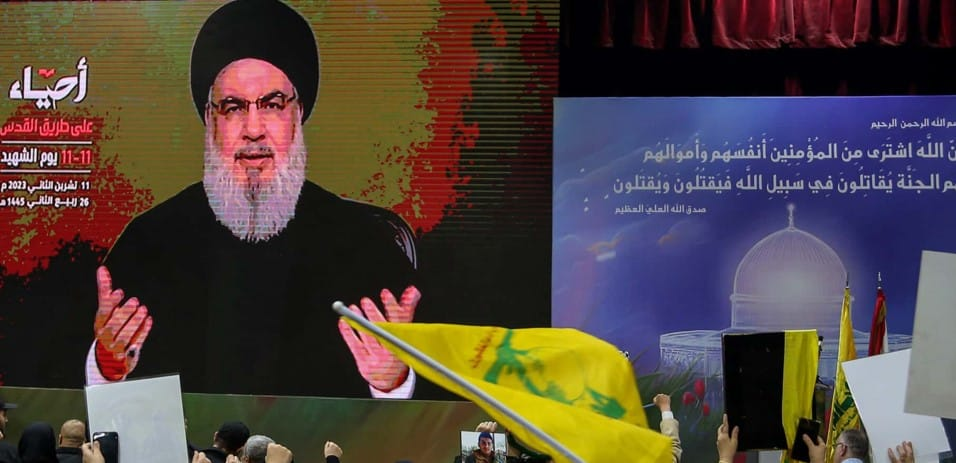
A brutal war is looming between the Lebanese terrorist group Hezbollah and Israel.
The Iran-backed radicals began firing anti-tank missiles and drones at Israel Oct. 8, one day after Hamas carried out its mass slaughter of 1,200 Israelis.
Four months later, the attacks — more than 700 and counting — haven’t stopped.
Israel has gotten the better of Hezbollah in most of these exchanges, destroying the group’s strategic assets and killing nearly 200 well-trained fighters.
But it has been at a terrible price.
Nearly 100,000 Israeli citizens of communities along the border have been forced to flee their homes.
Admittedly, roughly that many Lebanese citizens have fled their homes, too.
But that’s of little consolation to the Israelis.
Hezbollah has achieved something meaningful.
And the Israelis are warning — justifiably — their patience is running out.
Israeli Defense Minister Yoav Gallant recently issued an ultimatum: Either Hezbollah moves its forces north of the Litani River, which runs laterally across the middle of Lebanon, or Israel will unleash the full force of its military.
The Israeli demand is buttressed by UN Security Council Resolution 1701, which calls on Hezbollah to do exactly that.
But there are a few obstacles to restoring order.
For one, Hezbollah is not interested in withdrawing.
This is a group that exists for one reason: to wage war against Israel.
Nor are the group’s patrons in Iran interested in ordering the group to stand down.
Hezbollah is the Islamic Republic’s most powerful proxy.
And while Tehran has yet to unleash Hezbollah to fight a full-blown war, the regime appears content to let this crisis escalate.
The specter of a nasty, multifront war in the Middle East during the American election cycle now has the Biden administration’s full attention.
The White House has dispatched its Lebanon envoy, Amos Hochstein, to Israel in a bid to end the standoff.
The French are trying to help, too.
Some reports suggest Hochstein is making progress toward a diplomatic solution.
But Lebanese Foreign Minister Abdallah Bou Habib has reportedly rejected the Israeli and US demands that Hezbollah head north.
This reinforces what we already know: Iran’s terror proxy controls the Lebanese government.
It explains why Lebanon has collapsed both economically and politically in recent years.
In its current state, Lebanon can hardly afford another war.
The last battle between Israel and Hezbollah, in 2006, was devastating. Lebanon sustained significant damage and required massive international assistance to rebuild.
The looming war would likely be worse, with Israel vowing to enact its Dahiyeh Doctrine: Named after the Beirut suburb of Dahiyeh under full Hezbollah control, it entails the total annihilation of every Hezbollah enclave.
The big difference between this looming battle and the last, though, is Hezbollah’s capabilities.
Thanks to Iran, the group has stockpiled an estimated 200,000 rockets and missiles.
More than 1,000 of those are precision-guided munitions, which can strike Israeli strategic infrastructure with lethal precision.
Hezbollah’s fighters are also more professionally trained than they were during the last tussle, having fought alongside the Russian and Iranian militaries in Syria.
In short, Israel would almost certainly sustain more damage and casualties than it did in 2006.
In fact, this Middle East war promises to be more brutal than any other in recent memory.
Nobody in Israel welcomes this, particularly while the fighting in Gaza grinds on.
But some Israeli officials believe it might be necessary.
They note that Hezbollah aggression continues unabated, and it necessitates a response.
And every day the group is allowed to grow stronger means a more painful war for Israel in the future.
Better to drop the gloves now, they say.
Better to do it now, with the border already cleared of civilians.
And better to do it with the country already mobilized for war.
The White House is doing everything possible to defuse this powder keg.
Diplomacy should be given every chance to succeed.
But it’s time to face facts.
Diplomacy may not prevail.
War may be inevitable.
Washington must ensure the Israelis have all the ammunition and weapons they need to win.
The clock is ticking.
